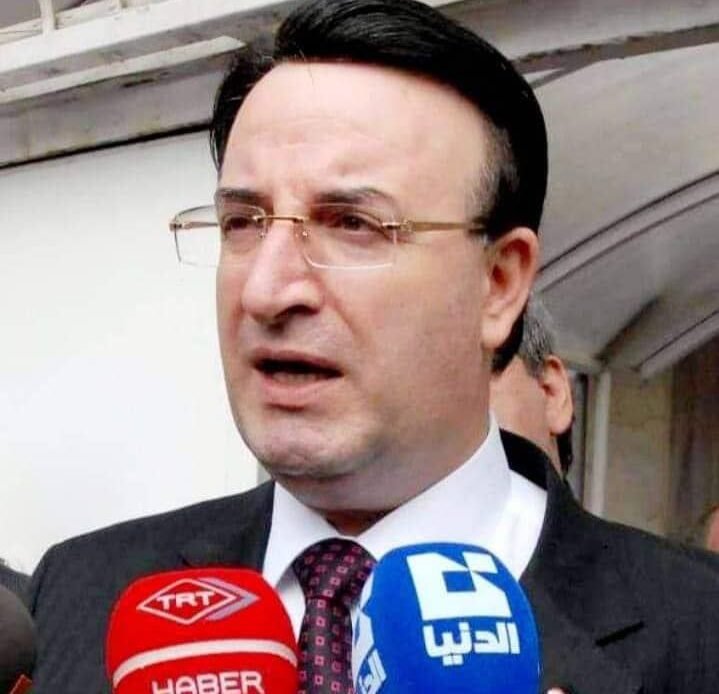By: Steven Sahiounie, journalist and political commentator
Steven Sahiounie interviews Dr. Nidal Kabalan, journalist, political analyst, and former Syrian Ambassador to Turkey.
According to the Iraqi Prime Minister, Mr. Shia Sudani, Syria and Turkey are moving closer to a possible normalization of relations which were broken after the U.S.-NATO attack on Syria for regime change which began in 2011.
Before 2011, Turkish President Recip Tayyip Erdogan and Syrian President Bashar al-Assad were close, and Erdogan famously addressed his counterpart in Damascus as ‘brother’. The two countries shared a long and safe border with business and tourism benefits for both sides. After Erdogan supported the U.S. side in the war on Syria, which utilized international terrorists passing through Turkey as a transit point on their way to fight in Syria, the relationship was broken.
Syria successfully resisted the attack orchestrated by U.S. President Barack Obama but has not recovered fully due to U.S. sanctions imposed. Now, it appears Syria may be close to a restored relationship with its neighbor to the north, as both countries share the same interest in a secure border and the elimination of terrorist groups and paramilitary separatist groups.
SCF’s Steven Sahiounie interviewed Dr. Nidal Kabalan, journalist, political analyst, and former Syrian Ambassador to Turkey.
Recently, the Iraqi Prime Minister said he hopes to announce a deal between Turkey and Syria to normalize their relationship. In your opinion, what is the groundwork necessary for this to materialize?
Syria’s conditions for normalizing relations with Turkey, which have been relaid by President Assad to the Iraqi Prime Minister, Mr. Shia Sudani, are identical to what has been relayed to previous mediators, such as the Russians and the Iranians. Top of the list is a solid commitment by Turkey to withdraw its occupying forces from parts of Syria, a cessation of support by Turkey to various terrorist groups operating in Idlib and other parts of the country, Ankara’s help in returning Idlib to the control of the Syria state, as well as control over the strategic M4 highway linking the coastal cities with Aleppo and other northern towns, Ankara’s help in lifting illegal and unilateral sanctions which have crippled the Syria economy for over a decade now, reopening legal border crossing points between Syria and Turkey, especially Bab al-Hawa, these are the main conditions that Damascus has long put forward as the basis for normalizing relations with Turkey.
Hayat Tahrir al-Sham, commanded by Mohammed al-Julani, is occupying Idlib. In your view, how will this terrorist group be dealt with, and who will clear out Idlib?
As far as Hayat Tahrir al-Sham and other groups in other parts of the country, they will have to be dismantled by politics or force, as a precondition for stability and security in the country. Joint efforts by Syria, Turkey, Iraq, Iran, and probably Russia in fighting all terrorist groups that have wreaked havoc in Syria for almost 14 years are a necessity for stability and security in the country.
The SDF, the Kurdish militia aligned with the U.S., had planned to hold elections on June 11, but have postponed them due to threats from Turkey. In your view, will the SDF repair its relationship with Damascus?
As far as the SDF is concerned, Syria and Turkey could cooperate in removing all armed aspects of the Kurdish militias that have been plundering the wealth of Syria, particularly gas and oil in the northern and northeastern parts of Syria with the help of the Americans, who have been exploiting Syrian gas and oil, and smuggling oil into Iraq, and from there into other parts of the region and the world. Any separatist entity that the Kurdish organizations, militias, and parties have been trying to form in the north of the country will have to be dismantled.
One topic that has enjoyed a consensus between Turkey, Syria, Iran, and Iraq is removing the possibility of any separatist Kurdish entity in this part of the region, so some solution through negotiations.
North of Aleppo is under the occupation of Turkish forces aligned with terrorists. If Turkey restores their relationship with Syria, how will Turkey deal with those terrorists who have been trying to overthrow the Syrian government?
For the political aspect of the crisis that could be initiated, but any separatist Kurdish entity in this part of Syria, or the region, is a taboo and shall not be permitted by all parties concerned. Other parts of Syria occupied by Turkish forces, or pro-Ankara militias north of Aleppo will have to go through mediation politics or military force and full control of the Syrian state of those territories is a non-negotiable condition for any normalization of ties between Damascus and Ankara.
Steven Sahiounie is a two time award winning Journalist
This article is originally published at Stratgic culture foundation



